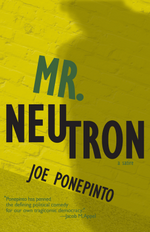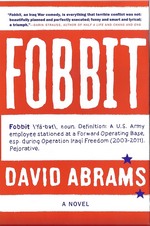
Tag: Satire
 How to Be a Perfect Christian: Your Comprehensive Guide to Flawless Spiritual Living
How to Be a Perfect Christian: Your Comprehensive Guide to Flawless Spiritual Living
by The Babylon Bee
eARC, 208 pg.
Multnomah, 2018
Read: May 13, 2018

I’m pretty sure my introduction to the concept of satire came from the works of “Jovial” Bob Stine (this was before he discovered you could make a bazillion dollars selling horror books to kids) — The Sick Of Being Sick Book, The Cool Kids’ Guide to Summer Camp, Don’t Stand in the Soup, and How to be Funny. I hadn’t thought of him for years. Until I read How to Be a Perfect Christian, that is.
I’m not trying to suggest that this book is the equivalent of satirical children’s books from the early 80’s and late 70’s. But it’s exactly what someone who grew up reading that kind of thing should read. Also, I’m glad I got to spend a few moments remembering Jovial Bob Stine, and I wonder if I still have those books somewhere (and how un-funny would my own kids think they are).
If you’ve ever read anything from The Babylon Bee, you know what to expect from these guys. If you haven’t — you either should, or maybe this isn’t the book for you.
Styling itself as a guide to sanctification — there’s even a handy ruler at the end of each chapter helping the reader to note their progress — How to Be a Perfect Christian is a hands-on guide to making progress in Cultural Evangelicalism. There’s a chapter on picking the right Church (what can they do for me?), what things to volunteer for at church (minimum of work, maximum of exposure/attention), how to use social media (if your Quiet Time doesn’t result in an Instagram post, was there a point?). There’s a wide variety in the types of jokes here: there are dumb and obvious jokes, some subtle, some clever — all pointed. Which is the idea, they’re pointed so they can deflate contemporary American Evangelicalism — its cultural (sociopolitical/cultural) manifestations, anyway.
Yes, sometimes the prose contradicts itself — because the target or punchline on page 70 is different than the target or punchline on page 47. But that’s okay for two reasons — 1. the jokes land on both pages 70 and 47 (these numbers are made up, by the way), and 2. this books isn’t really trying to make a coherent, consistent argument. At least not for the first 98%, anyway. But the jokes are funny — not all of them laugh out loud funny, but they’ll elicit a chuckle or a grin. Some might just leave you with a general sense of amusement. Most will find a way to strike home (and there are a few duds — but everyone will have their own list of duds, I don’t think there’s one in the book that everyone will dislike).
More importantly, everyone will find themselves at the receiving end of the serrated edge of the satire more often than they’d like. But not in a guilt-inducing way, but in a — “hmm, I should probably work on that” kind of way. Which, I trust, is the point.
The last two percent (for those clever enough to do the math) that I pointed at earlier? Yeah, that’s what the whole book driving toward — the lampooning is for fun but there is an overall point under-girding everything. A point, that’s both well earned, and very needed, by cultural Christians, sincere and thoroughgoing Christians, and a waiting world.
Solid satire — laughs with an edge — directed toward a deserving target. The conclusion was equally on-point and earned. I honestly expected less from this book — yes, I knew there’s be good laughs along the way and that the necessary sacred cows would be shot at — I just wasn’t sure if The Babylon Bee could pull off a piece this long, and count the whole thing as a pleasant surprise.
Disclaimer: I received this eARC from WaterBrook & Multnomah via NetGalley in exchange for this post — thanks to both for this.
—–

 Mr. Neutron
Mr. Neutron
by Joe Ponepinto
eARC, 300 pg.
7.13 Books, 2018
Read: March 1 – 3, 2018

It couldn’t be real. Just couldn’t. Besides, if someone brought a cadaver to life today, it would be under controlled circumstances—in a lab at some university, with the media and religious protesters in attendance. It would go viral on the web. He would have heard about it.
Still, Gray couldn’t dismiss the possibility. His timid psyche often cleaved to the supernatural, if only to explain the failures in his life. And dead men had been elected before, although they typically stayed in their graves and didn’t campaign.
Before I get into this — yes, this is a political satire. But it’s pretty apolitical. There are almost no political points made, few actual policies advanced or discussed, and certainly no mainstream parties are either pilloried or lauded. The satire is of this strange thing called American politics — the campaigns, the process, the press, the people involved. Conservatives, liberals, statists, libertarians, and everyone in between can read this safely without worrying about getting much tweaked by the book.
In the opening paragraphs we meet Gray (Davenport, we’re later told) and Reason Wilder. Gray is running a mayoral campaign and one of his candidate’s opponents is Reason. Right away, you can tell this book isn’t going for subtlety. We later meet Patsy Flatley (the advisor to Gray’s candidate), The Reverend Inchoate Hand, Breeze Wellington, and Randy (of various last names) — all of these names tell you a good deal about these characters (and I could’ve listed other examples). Ponepinto lays his cards on the table right away when it comes to his characters and the type of people they are.
Reason isn’t the best funded, most articulate, or most polished candidate — but there’s some impossibly strong magnetism about him and his simple promise that “Together we will do great things for this city,” without ever giving a specific idea how they’ll do that, or what a great thing might be. Virtually everyone who encounters Reason falls under his spell but Gray. Not only does Gray maintain some sort of skepticism about Reason, he notices a disturbing odor about him, the way his body doesn’t seem to work together organically, and frankly, doesn’t seem to belong together. It’s almost as if someone stitched him together from spare parts.
Once Gray starts speculating down that path, he becomes convinced that’s the case — and sets out to prove it. Along the way, this effort causes problems in his marriage (well, it brings problems in his marriage to a head); brings some powerful people into his life; and puts him in league with the strangest journalists you’ve probably encountered. This kicks off some overdue self-examination to go along with his hunt for information about Reason.
All the while, the campaign goes on: Gray’s duller than dull candidate tries to build a voter base, the well-funded front-runner has to work to remain relevant, and Reason’s cult grows in a way no one can believe (or deny). We see a debate, a fundraiser or two, press conferences, polls, and money — and the ways all of those can alter a campaign, especially the money.
One difficulty I had while reading this book was remembering it was a satire — Ponepinto’s writing frequently comes across as highly-crafted and nuanced, and then he’ll have someone named Randy do something filled with innuendo or something equally obvious or ridiculous and I’d have to remind myself I was reading a book about a Frankenstein’s Monster-like being running for mayor, and perhaps I shouldn’t take it too seriously. I do think that’s a strength of the book — I’d forget I was reading nonsense about impossible tings because the narration was just so serious. It is a funny book, at times, but not told in a way that underscores it, which somehow works.
I didn’t love the ending, honestly. But I absolutely get why Ponepinto did it — and good satires rarely have satisfactory endings anyway. This was better than a lot of them — for example, I’ve read almost all of Christopher Buckley’s novels and there’s only one of them that had an ending I can tolerate. So, “didn’t love” is pretty good. I thought the last couple of paragraphs were far too preachy, and could’ve been cut without really harming the novel and/or its message.
But before all that, we’ve got a very strange ride. You’re not going to see a lot like this — a little supernatural/monster, some pointed commentary on politics, a dash of romance, a nice friendship, and an odd collection of characters bringing all this to you. You should give it a shot. I have no idea what kind of follow-up Ponepinto might have in store, but I’m very curious.
Disclaimer: I received this eARC in exchange for this post and my honest opinions.
—–

 Legal Asylum: A Comedy
Legal Asylum: A Comedy
by Paul Goldstein
ARC, 284 pg.
Ankerwycke, 2017
Read: February 14 – 16, 2017

Elspeth Flowers is a career-fixated, libidinous, and conniving Dean of a state college’s Law School. She’s been working for years to put herself and her school into the prime position to launch themselves into national prominence. The School is on the verge of breaking into the Top 5 of U.S. News & World Report‘s ranking of Law Schools — a first for any state school. When that happens, the prospects for the trailblazing leader that got them there are so bright they’d inspire a song by Timbuk3. While Elspeth wants the success for the School, what she wants more than that are for her post-academia plans for herself to come to fruition. But on the cusp of her anticipated victory there are a few things that stand in her way:
- Cuckolded Assistant Dean
JimmyJames Fleenor who keeps (initially inadvertently) blocking her cunning plans. - An Enterprising Mail Room clerk, Wendall Ward, who just might be the most influential person we meet in these pages — definitely the most on-the-ball Mail Room clerk since Brantley Foster.
- A federal investigation into the business practices of the school’s biggest donor.
- A handful of secrets that are enough to get the accreditation committee to look long and hard at everything around the school.
Did I forget to mention that the ABA’s Accreditation Committee shows up days before everything is going to fall into place for Elspeth? Not just that, but thanks to circumstances and Jimmy James’ fumbling machinations, the committee is full of people who aren’t going to march to the beat of Elspeth’s drum or respond to her wiles. Their arrival shows that Elspeth’s best laid plans may look impressive (especially to her), but in reality are merely a tower of Jenga blocks threatening to topple. The question is: can she keep things standing long enough to get her Top 5 ranking and seize the brass ring — or will she find herself standing in a pile of rubble?
I like to think I learned a lot about the state of legal education today from these pages — even if the details are exaggerated for the purposes of satire there’s enough truth at the heart of them to educate the reader. Competition can drive the most cut-throat amongst us to extremes — and when the rewards for winners are what they can be in this area of academia, there’s a lot of incentive for people to get very competitive.
This is Goldstein’s fifth novel (I believe), and it looks like this is the first that isn’t a straightforward legal thriller. The experience he gained from those other novels probably served him well as he attempts to stop into another, and far trickier, genre. His characters are well-developed and well-used, his pacing is good, and he reveals plot complication after plot complication like a pro. He doesn’t go for cheap laughs and doesn’t demean the targets of his satire — nor does he pull his punches. It’s not a laugh-out-loud funny book, but it’s amusing and he’ll elicit more than the occasional grin as you read it.
One thing I’ve noticed about satirical novels is that endings are the hardest part — I’ve stopped looking for strong endings in satirical novels, I just hope for not terrible endings. Plots just tend to get away from the authors — like Soap Box Derby cars with cheap brakes on steep hills. Things in Legal Asylum threatened to get away from Goldstein, but he largely managed a satisfactory ending. I’m not 100% convinced it wasn’t more by authorial fiat than by being true to the characters (particularly Elspeth), but it was close enough that I could swallow that last chapter without much difficulty.
Do I think I’d find this more amusing if I was in the legal profession, had some experience with Law School, or was closer to my time in higher education in general? You bet. Is all of the humor lost on me because none of the above apply? Nope — and the same is likely for other readers. This is a recommended read for those who like smart books — particularly those about smart people who don’t always act like they are. Strong writing, satire that’s on-target without being mean, good characters and an ending that’s pretty satisfying — it’s hard to ask for more
Disclaimer: I received a copy of this from the author’s publicist in exchange for this post and my honest opinion.
—–

 Fobbit
Fobbit
by David Abrams
Paperback, 384 pg,
Grove Press, Black Cat, 2012
Read: Jan. 23-25, 2014
I enjoy a good satire — no matter if the target is one I identify with or oppose, a good satire is a treat. Fobbit didn’t totally work for me as a satire, but it came close.
As the cover says, a Fobbit is someone stationed at the Forward Operating Base during the Iraq war. The novel follows a handful of Fobbits as they try to survive their deployment while accomplishing as much as The Powers That Be allow them to (which includes a surprising number of PowerPoint presentations).
Staff Sergeant Gooding of Public Affairs attempts to keep various media outlets appraised of events, but before he can, he has to run everything up the flagpole — beginning with the impossibly political Lt. Col. Harkleroad. By the time Harkleroad and his superiors get done massaging/mangling the presentation of the facts to suit their needs, CNN, etc. have already discovered the reality, ran their stories, and moved on to something else.
On the other end of things, Sgt. Lumely is on the front-lines, but has to endure the inept command of Capt. Abe Shrinkle, who’s probably just as dangerous to his men as Iraqi insurgents (if not more). Lt. Vic Duret is Shrinkle’s commander, and he’s as frustrated trying to minimize Shrinkle’s damage.
Fobbit starts slow, and builds slower — but, eventually (and organically), the plot picks up and the lives of these poor Fobbits spiral out of control. Then it stopped feeling like a “eat your veggies” kind of read, and one that I could enjoy.
Fobbit‘s not as pointed as Catch-22, or as laugh-out-loud funny as Mash: A Novel About Three Army Doctors — as much as it wants to be in that company. But it’s honest, upfront, and feels authentic.
This is a satire of the circumstances these soldiers found themselves in, about the way the war was being fought, not about whether it should be or not. As nearly as possible, it’s an a-political book — pro-Operation Iraqi Freedom or anti- — it can be appreciated for what it is. Well-written, with characters that are a little more human than satire necessitates, and a world more grounded than expected.
—–

 The Love Song of Jonny Valentine
The Love Song of Jonny Valentine
by Teddy Wayne
Hardcover, 304 pg.
Free Press, 2013
Read: Dec. 25, 2013
Jonny Valentine, the 11-year-old pop sensation, desperately wants to reach adolescence (probably not all that different from others his age) — but he’s very, very aware what that will do to his voice, his appearance — overall, his appeal to the tween and teen demographics. And he’s counting on it, if he doesn’t sell more to teen girls, he’s sunk. His career is dead.
That’s not the only part of his life that he sees in marketing terms. His haircut, the amount of fat and calories he consumes, his video gaming, exercises, amount of sleep — everything is micromanaged to the nth degree by his mother/manager, studio, vocal coach, and, to a lesser extent, his bodyguard (the closest thing her has to a friend). Everything he thinks, everything he wears he runs through a mental calculus wondering what it’ll do for sales, social media exposure, ticket sales, etc. How anyone can deal with this all, much less a near-adolescent, is unfathomable.
Honestly, ticket sales and record sales have dropped off a little for this phenom, so the record company begins to take a more hands-on approach to things — inventing news stories, coming up with a new media relations plan, etc. etc. And Jonny’s life becomes a little harder.
At the core of this story though, is a little kid, who just wants to be a little kid. He wants his mom to be more of a mom than a manager, he wants to spend time with his best friend from before he made it big, he wants to screw around and play. At the end of the day, I feel more pity for Jonny than I did for Auggie Pullman from Wonder.
Most of the observations/comments on/critiques of celebrity culture that are given here, are things we’ve all seen or made ourselves. But by putting them into the mouth and head of a kid, rather than an outsider adult, makes it all so much more effective.
Darkly comic (not terribly funny, though), insightful, sympathetic. A worthwhile read.
N. B. just because this is about an eleven-year-old, don’t for a second think this is appropriate reading material for that age. This isn’t MG, this is written for an adult audience.
—–






